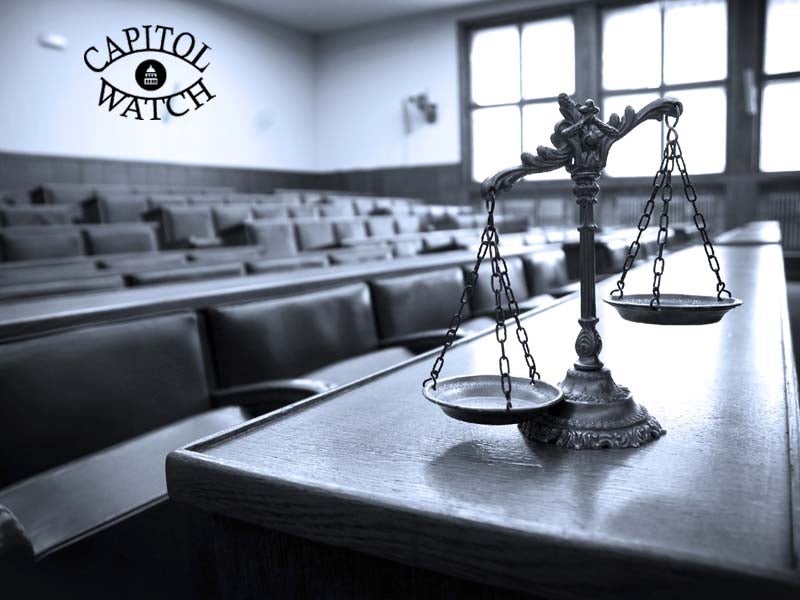Congress Unleashes Attacks on Americans’ Right to Have Their Day in Court
Proposed legislation protects corporations and government agencies run amok, while closing the courtroom door to everyday people.

This page was published 8 years ago. Find the latest on Earthjustice’s work.
Editor’s Note: On March 10, the U.S. House of Representatives passed H.R. 720, a bill that could have a chilling effect on people’s efforts to file lawsuits that may have untested or non-existent legal theory. The House also passed H.R. 985, the Class-Action Restrictions and Asbestos Trusts bill (H.R. 906 was merged with H.R. 985), impacting sufferers of illness caused by asbestos and making it harder for groups of people to file class action suits against corporations. The bills will next be referred to the Senate.
Imagine the horror a family endures when a loved one is diagnosed with a rare and aggressive form of cancer. Worse yet, the family learns that the cancer was preventable; it developed as the result of exposure to an industrial toxin. The victim and his family rightfully seek compensation for the harm caused by the company that exposed the victim to this toxic chemical. But they learn that the victim and his loved ones will be forced to disclose confidential information on public websites, including the victim’s name, address, medical information and social security data, along with how much the victim and his family receive in settlement compensation.
This is the crux of what the proposed “Furthering Asbestos Claim Transparency (FACT) Act of 2017” (H.R. 906) seeks to do. While victims and their families seeking financial compensation would be forced to expose their personal information—making them easy targets for identity thieves, financial predators and discriminatory insurers—the bill wouldn’t force companies that have long covered up the lethal effects of exposure to asbestos to reveal anything, including information about where asbestos remains.
The proposed legislation clearly protects corporations over people and is meant to keep victims and their families from going to court. H.R. 906 is just one in a series of proposed bills the U.S. House of Representatives will be voting on this week and next that would essentially shut the courthouse door to ordinary people seeking justice in America.
The proposed legislation clearly protects corporations over people and is meant to keep victims and their families from going to court.
The proposed bills are wide-ranging, impacting people’s health, financial security and ability to right corporate or government wrongs. Another proposed piece of legislation, H.R. 1215, targets victims of medical malpractice, limiting their ability to seek compensation after being injured. And another proposed bill, H.R. 985, takes a swipe at class action lawsuits, the legal tools that allow large groups of people to take action against companies whose defective products or illegal behavior put their health and safety at risk. Paul Bland at Public Justice gives a good breakdown here of why class action suits are so important.
Yet another proposed bill, H.R. 720, could have implications for Earthjustice’s work to defend the right to a healthy environment. The bill takes aim at what industry calls “frivolous lawsuits.” The bill would force judges to impose sanctions, such as fines, the dismissal of cases or even disbarment, against attorneys who bring cases deemed “frivolous.” Currently, judges may impose sanctions at their discretion, but this overreach by the legislative branch would force judges to punish people who bring legal cases that may not bear fruit. All it does is embolden industry defendants to call a wide array of cases with merit, backed by strong evidence, “frivolous,” thereby threatening plaintiffs with punishment. This could have a chilling effect on our work and that of civil liberties groups, especially with respect to cases brought on civil rights grounds where there is often little legal precedent.
Landmark legal cases, including Brown v. Board of Education, which led to the desegregation of public schools, and Loving v. Virginia, which invalidated laws banning interracial marriage, faced trial courts in which judges didn’t think there was a case to be made. Should sanctions on “frivolous” lawsuits go forward, they could keep cases out of the courtroom that demand the law exercise fundamental fairness toward otherwise unpopular, under-resourced or marginalized groups.
What these proposed bills all have in common is that they would give the upper hand to polluting industries and government agencies run amok, while weakening protections for the safety, health and well-being of everyday people.
With a president who loathes the courts almost as much as the free press and a Congress backed by corporate and industry interests, we will inevitably see more attacks aimed at weakening people’s ability to defend environmental and health protections. We know Congress has the Endangered Species Act in its crosshairs, as well as other regulations that compel the government to protect water, air and public lands.
Americans’ ability to go to court to challenge harmful decisions made by their government is as fundamental to our democracy as freedom of speech and the right to vote. Tell your representatives to stop meddling with Americans’ right to seek justice and to instead defend people’s right to have their day in court.
Take action by contacting your Congressmen and women. Find out who to contact and how to reach them by clicking here. Our partners at the American Association for Justice have all the information you need to make your voice heard.
ABOUT THIS SERIES
The 45th U.S. president, Donald J. Trump, is bent on gutting environmental protections, and—with a polluter-friendly Congress at his side—he’ll likely do everything he can to dismantle our fundamental right to a healthy environment. The Capitol Watch blog series will shine a light on these political attacks from Congress and the Trump administration, as well as the work of Earthjustice and our allies to hold them accountable.
Established in 1989, Earthjustice's Policy & Legislation team works with champions in Congress to craft legislation that supports and extends our legal gains.